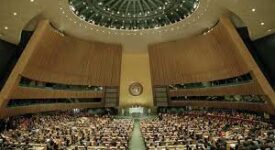The EU and Turkey’s Asylum Policies in Light of the Syrian Crisis
Julietty Tolay (Istituto Affari Internazionali)
In the first half of last year, Turkey and the European Union made considerable efforts in the area of asylum legislative. In April 2013, Turkey adopted a “Law on Foreigners and International Protection” and, in June 2013, the European Parliament approved the „Common European Asylum System” (CEAS). Nevertheless, there are two different stories underlying these new legislations. On the one hand, Turkey is praised by the international community for the adoption of the Law on Foreigners and also the very fact that they welcomed more than 600,000 Syrian refugees since June 2011. By contrast, the EU has faced criticism for its slow response to the Syrian crisis and its reluctance towards the standardization of the asylum policies of individual Member States. This situation is somewhat surprising given that Turkey has long been seen as a state whose asylum policy significantly lagged behind the higher EU standards (as is repeatedly emphasized in the annual progress reports issued by the European Commission).
Continued fighting in Syria has resulted in a massive influx of refugees into neighboring countries. According to the Office of the UN High Commissioner for Refugees (UNHCR) released in mid-December 2013, there was up to 2.3 million Syrian refugees, of which 600,000 sought refuge in Turkey, while only 55,000 in the EU. The EU Member States were criticized by many observers for not fulfilling the promises of assistance, as well as for not providing sufficient resources needed for accepting refugees. Syrians are required to have a Schengen visa, but most of them do not have any documents or evidence of their name or nationality and this is why they try to enter the EU illegally. In contrast, Turkey implemented, as a response to the Syrian crisis, the policy of “temporary protection” for the Syrians. In practice, this means that refugees have access to basic humanitarian services in Turkey, including health care. Syrians who enter with a valid passport may be accommodated wherever they chose to settle down while the refugees without proper documents are moved into refugee camps.
There are many areas where Turkey and the EU can work together and find ways how to better address the needs of the refugees in general and the Syrian refugees in particular. Firstly, the process of granting asylum should be reviewed and, more importantly, the concept of solidarity should be taken seriously. The concept of solidarity is often used in speeches and reports, though it is almost never applied in practice. Solidarity in this context means solidarity between the EU Member States, solidarity with the countries that host large numbers of refugees, and most importantly, solidarity with the refugees themselves.
(The study can be uploaded here:
http://www.iai.it/content.asp?langid=2&contentid=1040)
Game Over? The EU’s Legacy in Afghanistan
Edward Burke (Fride)
The waxing question, to which everyone would nowadays like to know the answer, is whether the United States would be able to negotiate an agreement to maintain a certain number of troops in Afghanistan. If the US was not about to succeed, Taliban’s return to power is very likely. Certainly, with the complete withdrawal of US forces from Afghanistan, a power vacuum would be created and a new conflict would arise, probably between the Taliban and the tribes that made up the original Northern Alliance. And since the Afghan forces are not (yet) capable of performing demanding military operations independently, the American assistance in intelligence and air support is indispensable.
The sealing of such an agreement is also essential for the European Union, if only because without the presence of the US forces, no one can guarantee security to those civilians who provide training for Afghan officials, police officers and judges. The Afghan President, Hamid Karzai, builds his opposition to the mutual agreement on one important point, on which the US negotiators insist – it is that the US is given jurisdiction over their troops so that they could not be tried in Afghan courts. However, after the recent presidential elections in Afghanistan it is obvious that both candidates would like to see US troops to extend their presence in the country. Hence, the West should view the presidential elections as a new opportunity to change things for better.
The fundamental problem, which the EU should seek to address in the future, is to find ways to protect from the omnipresent corruption the funds channeled to Afghanistan as a part of its development assistance programs. To get a better idea about the magnitude of the whole problem, in the year 2009 alone, people close to President Karzai have reportedly managed, through the New Ansari currency exchange, to siphon off $ 2.5 billion from the development assistance funding. Another big problem is the falsification of the election results. According to the author, the best way to solve this issue is the cooperation with the mission of the United Nations. At the same time, the provision of the development assistance should be tied to certain conditions, such as the reform of the judiciary, which Afghanistan with its insufficient separation of executive and legislative powers so desperately needs. Still, many experts on Afghanistan have long argued that, ultimately, the only chance to build a sustainable Afghan state in the future would have to be based on an agreement between the government, the Taliban and the Northern Alliance, though this may seem impossible at the moment.
(The study can be uploaded here:
http://www.fride.org/publication/1176/game-over?-the-eu%E2%80%99s-legacy-in-afghanistan)
An Admission of an Expensive Failure – the EU Proposes New Energy and Climate Change Targets
Raoul Ruparel (Open Europe)
The European Commission has recently proposed new targets in the areas of energy and climate change. According to the British eurosceptic think-tank Open Europe, the European Union has on the one hand confirmed its costly mistakes but, on the other hand, it also signaled that its future policy-making will require prudent decisions based on a great deal of flexibility, careful control of proposals (based on environmental quality and economic studies) and improved cost efficiency. The Open Europe think-tank also announced that it would soon publish a more complete and comprehensive study, which will also outline a most effective way forward for the EU’s energy and climate change policies.
The author tentatively estimated that up to 95 percent of the originally expected annual revenues (worth 20.4 billion pounds) from the EU climate-energy package have not yet materialized, while the estimated average annual cost (about 3.4 billion pounds) are close to the reality. He noted that two conditions must be met before the figures projected by the EU are to become a reality. First, a corresponding global commitment in the area of energy and climate policy should be accepted. Second, the EU should be at the forefront of this initiative. However, the global agreement was not reached and so the reduction of greenhouse gas emissions and the switch to renewable energy sources is more of a local than a global matter. The total of emissions continues to rise.
As far as the European Emissions Trading System (EU ETS) is concerned, the Commission retains the current suspension of the issuance of a large number of emission allowances (back loading). It is not clear whether this measure can improve the effectiveness of the EU ETS. Even with the limitation of emission allowances, their low price continues to discourage long-term investment in renewable energy. Therefore, not only Great Britain but also other EU Member States are unlikely to meet the binding targets by 2020.
(The study can be uploaded here:
http://www.openeurope.org.uk/Article/Page/en/LIVE?id=19521&page=FlashAnalysis)







